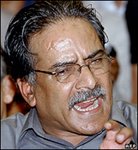 In his latest avatar as geo-politician, Maoist supremo Prachanda claims India is trying hard to retain the monarchy. In the considered opinion of the supreme commander of the “People’s Liberation Army,” expressed in an interview with BBC Nepali Service, the Indian Army remains at the forefront of the campaign.
In his latest avatar as geo-politician, Maoist supremo Prachanda claims India is trying hard to retain the monarchy. In the considered opinion of the supreme commander of the “People’s Liberation Army,” expressed in an interview with BBC Nepali Service, the Indian Army remains at the forefront of the campaign.For a man who once boasted that his real war would be with the Indian men and women in uniform dispatched to prop up the “old regime,” this progression in thought has all the hallmarks of an honorable retreat.
For students of the triangulation school of thought in India’s Nepal policy -- such as yours truly -- the Maoist supremo was merely stressing the obvious. However, he used another BBC question to set the tone of the debate that is likely to evolve over the weeks and months. The Nepalese Maoists would support India’s attempt to get a permanent seat in the United Nations Security Council if New Delhi reconsidered some of its policies toward its small neighbors.
Our erudite chairman continued: “[New Delhi] presently follows what is known as Nehru doctrine under which it seeks to intimidate, interfere, expand its influence and dictate its terms on its neighbors.”
If India reconsidered such a policy, then it would deserve a permanent seat in the Security Council. Now, Prachanda didn’t expound on how such a policy shift might overcome a Chinese veto. Or, even before that, receive Indonesia’s, Pakistan’s and other key Asian nations’ endorsement in the regional rounds. But, then, Prachanda was merely expressing his party’s opinion.
And no insignificant one, at that. This assertion would be the easiest one for the most fanatical of royalists – barring perhaps the religious right -- to agree with. (Any subtle overtures here, Comrade, on, say, secularism for ceremonialism?)
Rounding off the circle, our comrade in chief opined that U.S. pressure and India’s hard-line groups have emerged as the hurdle to Nepal’s independence. Something the Great Helmsman’s country would easily concur with regardless of who those hardliners actually are.
Asked about Nepal’s northern neighbor, Prachanda said China’s policy toward Nepal has traditionally been to back the king as a factor of stability. But the April Uprising against the monarchy may have forced China to reconsider that policy, he added. The operative word here may be “may”. Could a Maoist-palace alliance be in the works here? Not unlikely considering what else the rebel in chief had to say about China.
Urging India to concede the right to self-determination to Kashmiris and people in its northeastern states, he acknowledged the urgency of granting the same opportunity to Tibetans. “But we think that the autonomy that the Chinese government has given there is in accordance with the aspirations of the Tibetan people,” he added.
Asked about the strategic importance of the new Beijing-Lhasa railroad, Prachanda said Nepal and South Asia in general would stand to gain. But not before explaining how Nepal has had to rely on its southern neighbor because of the economy, open borders, transport and communication. “This has put us in a disadvantageous position vis-à-vis India which, instead, is in a position to take undue advantage [of us].”
Few might have expected Prachanda to praise Osama bin Laden. So he condemns Al Qaeda’s attacks on innocent people the world over under a blind religious garb as terrorist activities. But only to make his next point. “[I]t is the US which is a bigger terrorist than bin Laden in the sense that it was the US which created him during the war against the Soviet Union in Afghanistan.”
In a rare deference to reality over rhetoric, Prachanda conceded that the Maoists were incapable of fighting the US. Then comes the olive branch. “It’s not that we do not want to have relations with the US once we go to power. All we want is to wage an ideological resistance against the US muscle-flexing in the world.” An unexpected resonance of Noam Chomsky and far-left fringe of the Democratic Party. (The Maoist supremo must be watching and listening to all those bin Laden and Zawahiri tapes.)
But when it comes to Nepal and Nepalis, Prachanda remains defiant. “There are more than a hundred countries which are smaller than us. It is not easy for the US to invade us, like it did in Afghanistan and Iraq. If India and China have such designs those would not succeed either, because forces capable of countering such designs have already emerged here.” Does his spirit have any less nationalistic ebullience than all those songs on Panchayat-era Radio Nepal?
Look at the ground Prachanda has prepared. He can claim he tried his best to republicanize Nepal but, as a true communist, can no longer ignore the objective realities of geopolitics and globalization. Those Nepalis who’ve always believed that the monarchy isn’t the problem would certainly not deny Prachanda that Marxist fig leaf.